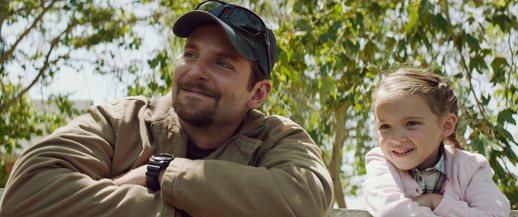Movie Review: American Sniper
By Matthew Huntley
BoxOfficeProphets.com

Chris Kyle’s story is inherently moving, yes, but if viewers respond positively to American Sniper, I can’t help but wonder if it’ll be because it’s based on a real-life individual and not because the film itself is actually effective. Although it’s serviceably made and well acted, it’s essentially a genre picture, and as such, it’s not terribly distinct or innovative. The way Chris’s story has been adapted to the screen, from a screenplay by Jason Hall, based on the book by Kyle, Scott McEwen and James Defelice, isn’t’ all that different from other war dramas, whether or not the characters were based on actual people. The film stirs us to a degree, and it certainly makes us empathize with Chris and his fellow soldiers, but these effects tend to come with the territory of it being a war drama in the first place. Ultimately, American Sniper doesn’t go above or beyond what we expect, and therefore its emotion, tension and entertainment value get diluted.
The issue is that Eastwood and Hall have decided to tell Chris’s story linearly and in a straightforward, rather uninspired fashion. They employ little if no risk in the narrative structure and the film simply goes from point A to point B without any surprises. We first meet Chris as a kid, learn that his core values were instilled in him by his stern yet loving father, and then catch up with him when he’s 30-years-old. He initially dreams of being a cowboy and professional rodeo competitor, but after sustaining an arm injury, he decides to enlist in the United States Navy SEALs.
The film then proceeds to show us Chris (Bradley Cooper) enduring the hard and grueling SEALs training program; meeting and courting his future wife, Taya (Sienna Miller); and then deploying to Iraq, where he would become an expert marksman and earn the nickname, “The Legend” on top of the label, “The deadliest sniper in United States military history.” He’s credited with over 160 kills and the film repeatedly underlines the idea that Chris’s dedication remained steadfast and that he truly believed what he was doing was for the greater good.
This latter point seems to be what the filmmakers want us to take away—that Chris Kyle and other soldiers like him risked their lives to protect the country they loved, without hesitation or equivocation. It doesn’t question what they were doing was either right or wrong, only that they had a mission and would do anything and everything to carry it out. It also doesn’t bother going into the politics of the Iraq War or showing us the perspective of the Iraqis, whom it paints merely as “savages” (a term the Americans use more than once). The movie is simply about this one man’s experience in combat.
Unfortunately, Chris’s experience doesn’t come across as all that compelling, at least not in the form of American Sniper. Perhaps it would have at one point in time, but after Hollywood has given us so many war dramas, this one doesn’t approach its subject from an interesting enough angle to make us think we’re watching anything new and different. We care for and sympathize with Chris, to be sure, but this seems inevitable given how likable and respectful a man he was. It helps that Bradley Cooper, who continues to show his range as an actor, is so likable himself.
The film mostly goes through the motions of the genre and we watch, scene after scene, as the SEALs monitor various cities in Iraq as marines hunt for members of al-Qaeda, particularly Abu Musab al-Zarqawi (one of the founders of Iraq’s al-Qaeda faction) and his second-in-command, whose torture practices earn him the moniker “The Butcher.” All the while, the U.S. soldiers are attacked by locals and/or shot at by an insurgent sniper, whom the film views as Chris’ counterpart on the Iraqi side.
With these “evil” characters in place, the movie can’t help but subscribe to action movie conventions and subsequently glorify war. For instance, we see the enemy sharpshooter assemble his rifle similar to how Arnold Schwarzenegger prepared for battle in “Commando,” and then tie his headband like Sylvester Stallone did in “Rambo.” We also get a CGI version of Chris’s final, crucial bullet as it flies through the air in slow motion, followed by him outrunning a sandstorm to catch up with his convoy in just the nick of time before bombs start going off.
Other familiar devices are tossed in that primarily function as emotional button pushers, including the young, distracted soldier who talks about marrying his girl back home; or the men enduring PTSD, unable to escape the sights and sounds of combat when they return home.
These criticisms aren’t meant to undermine Chris’ or any other soldiers’ service, and I do believe the movie’s details are characteristic of real-life war conditions. But they are also characteristic of traditional war movies, and so American Sniper doesn’t stand out as something we really haven’t seen before, and because it chooses to play its perspective safe and straightforward, rather than complex and polemical, it doesn’t exactly rile us up intellectually.
I’ve no doubt Chris Kyle and every other soldier’s military story is unique and emotionally gripping in its own way. American Sniper illustrates this during its closing credits, when it shows us archival footage of Chris’ funeral and the numerous dedications he received around Texas. Unfortunately, everything before it feels all too standard. Chris’s story has been told, yes, but not in a very interesting or absorbing way.